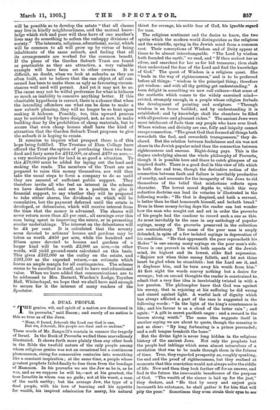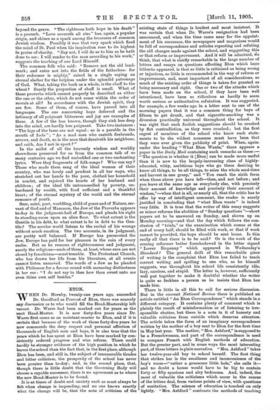its proverbs," said Bacon ; and surely of no nation
is this so true as of the Jews.
" Hear, 0 Israel, Jehovah the Lord our God is one,
But we, Jehovah, His people are dual and so undone." These words of Mr. Zangw ill's contain in essence the tragedy of Israel. In the Book of Proverbs we find them marvellously illustrated. It shows forth more plainly than any other book in the Bible the twofold nature of the only people among whom religious genius was not an occasional but a continuous phenomenon, rising for consecutive centuries into something like a constant inspiration ; at the same time, a people whose greatest prophets failed finally to free them from the bondage of Mammon. In his proverbs we see the Jew as he is, as he was, and as we suppose he will be,—not at his greatest, the true Israelite in whom was no guile; not at his worst, a man of the earth earthy; but the average Jew, the type of a dual people, with his love of learning and his appetite for wealth, his inspired admiration for mercy, his natural thirst for revenge, his noble fear of God, his ignoble regard for man.
The religions sentiment and the desire to know, the two spirits which the modern world distinguishes as the religious and the scientific, spring in the Jewish mind from a common root. Their conceptions of Wisdom and of Deity appear at times to be almost interchangeable. " The Lord by wisdom hath founded the earth," we read, and " If thou seekest her as silver, and searchest for her as for bid treasures; then shalt thou understand the fear of the Lord and find the knowledge of God." The quest of Wisdom is a religious quest. She " leads in the way of righteousness," and is to be preferred before all things: "wisdom is the principal thing; therefore get wisdom : and with all thy getting get understanding." A keen delight in something we now call culture—that sense of the aesthetic which comes to the widely exercised mind— existed, strangely enough, in a people whose religion forbade, the development of painting and sculpture. " Through wisdom is an house builded ; and by understanding it is established: and by knowledge shall the chambers be filled with all precious and pleasant riches." The ancient Jews were more intolerant of fools than any people who have ever lived. Where wisdom and divinity are one, folly and iniquity cannot. escape connection. "The great God that formed all things both rewardeth the fool, and rewardeth transgressors," they de- clared. But the relation between foolishness and sin was not closer in the Jewish popular mind than the connection between righteousness and success. Right-doing pays. This is the dogma underlying almost the whole philosophy of Proverbs, though it is possible here and there to catch glimpses of an inspired doubt. There is a good deal in this view of life which is both fine and true, though the derivative notion of the connection between fault and failure is inevitably productive of cruelty, and accounts for the incapacity of the Jews to rid themselves of the belief that misfortune reflects upon character. The lowest moral depths to which this very seductive doctrine can lead its votaries is illustrated in the following words : "He that is despised, and hath a servant, is better than he that honoureth himself, and lacketh bread." Even in these money-loving days the reader can but wonder how the man who sought out and set in order the proverbs of his people had the candour to record such a one as this. As must inevitably be the case in any anthology of popular , sayings, many of the proverbs preserved in the collection are contradictory. The cause of the poor man is amply . defended, in spite of a few isolated sayings in deprecation of his condition. "He that oppresseth the poor reproacheth his Maker " is one among many sayings on the poor man's side. There is one proverb in which both aspects of the Jewish mind, its highest and its lowest, alike find expression. " Rejoice not when thine enemy falleth, and let not thine heart be glad when he stumbleth : lest the Lord see it, and , it displease him, and he turn away his wrath from him." At first sight the words convey nothing but a desire for revenge; but on second thoughts the reader is constrained to, admit that a very fine idea is inextricably twisted in with a low passion. The philosopher knew that God was against his enemy, that in rejoicing at his suffering he did wrong and sinned against light. A woeful lack of dignity which has always afflicted a part of the race is suggested in the following words : " In the light of the king's countenance is . life ; and his favour is as a cloud of the latter rain " ; and. again: "A gift in secret pacifieth anger : and a reward in the bosom strong wrath." The same idea suggests itself in another saying we are about to quote. though the meaning is not so clear: "By long forbearing is a prince persuaded; and a soft tongue breaketh the bone."
But the divine light is never long hidden in the religions history of the ancient Jews. Not only the prophets but the people had inklings which seem almost miraculous of a 'revelation that was to be made through them in the fulness' of time. True, they regarded prosperity as, roughly speaking, the end and the proof of righteousness, but they realised at moments that this conviction would not always solve the riddle of life. Now and then they look farther off for an answer, and 'find in the future the irrevocable beneficence of the purpose of God. " The wealth of the sinner is laid up for the just," 'they declare, and " He that by usury and unjust gain increaseth his substance, he shall gather 'it for him that will pity the poor." Sometimes they even strain their eyes to Bee beyond the grave. "The righteous hath hope in his death" is a, proverb. "Love covereth all sins" has, again, a popular origin, and shines as a spark among the treasures of common Jewish wisdom. Possibly it was that very spark which fired the mind of St. Paul when his inspiration rose to its highest in praise of charity. " Say not, I will do so to him as he hath done to me : I will render to the man according to his work," suggests the teaching of our Lord Himself.
The common folk who said: "Remove not the old land- mark; and enter not into the fields of the fatherless: for their redeemer is mighty," raised in a single saying an eternal shelter for the helpless under the splendid patronage of God. What, taking the book as a whole, is the chaff to the wheat P Surely the proportion of chaff is small. What of those proverbs which cannot properly be described as either the one or the other, which do not come within the order of morals at all P In accordance with the Jewish spirit, they are few. Some of them, of course, have passed into all languages. The one concerning hope deferred and the intimacy of all poignant bitterness and joy are examples of these. A few of the less known, though they sink less deep into the mind, are hardly less poignant. Take two instances : " The legs of the lame are not equal : so is a parable in the Mouth of fools " ; "As a mad man who casteth firebrands, arrows, and death, so is the man that deceiveth his neighbour, and saith, Am I not in sport ? "
• In the midst of all the heavenly wisdom and worldly shrewdness preserved for us from the common talk of so many centuries ago we find embedded one or two enchanting lyrics. Were they fragments of folk-songs P Who can say P Those who made them sang of the ideal woman of their country, who was lovely and prudent in all her ways, who stretched out her hands to the poor, clothed her household in scarlet, and rejoiced the hearts of her husband and children ; of 'the ideal life untrammelled by poverty, un- burdened by wealth, with food sufficient and a thankful heart; of the eternal mystery of the world and the eternal romance of youth.
Seer, saint, poet, worldling, child of grace and of Nature, ser- vant of God and of Mammon, the Jew of the Proverbs appears to-day in the judgment-hall of Europe, and pleads his right to standing-room upon an alien floor. To what extent is the Gentile in his debt, to what extent is he in debt to the Gen- tile P The secular world listens to the recital of his wrongs without much emotion. The two accounts, in its judgment, are pretty well balanced. If Europe has persecuted the Jew, Europe has paid for her pleasure in the coin of every realm. But as he reasons of righteousness and judgment, surely the religious—such of them, at least, whose ears are not closed by fanaticism—must tremble. The Protestant Church, Who has drawn her life from his literature, at all events cannot listen unmoved. The words of a Jew as he pleaded with Pliilemon for a favour sound with menacing distinctness in her ear : " I do not say to thee how thou owest unto me even thine own self besides."











































 Previous page
Previous page